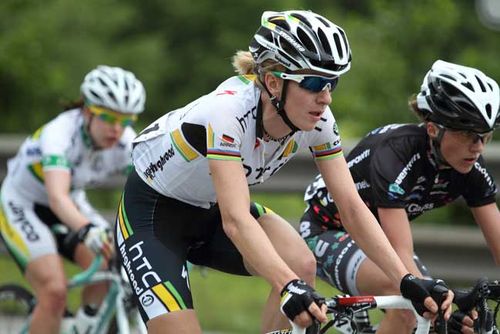�� 
The Emakumeen Bira doesn’t exactly roll off the tongue. But this hilly five-stage, four-day UCI-sanctioned race through Spanish Basque country, held annually since 1992, is one of the most important events in women’s professional cycling—the last big race before the Giro d’Italia Femminile, the Tour de France of women’s cycling.��
This year the Bira, which started in Durango, Spain, on June 9, was packed with the biggest names in women’s cycling, including six members of the top-rated . I spoke with Judith Arndt, the 34-year-old current German National Time Trial Champion, 2009 winner of the Bira, and 2004 World Road Champion the night before the first stage. Here’s what one of the best, most consistent female riders in the world had to say about the state of women’s cycling, her teammates, the Lance situation, and the sad crash that killed her teammate Carla Swart in South Africa last January. Arndt didn’t win this year’s Bira—Dutch cyclist Marianne Vos won three stages to take the overall title—but the loss made her even hungrier to come on strong in the Giro, which starts July 1.
—
How is your season going so far?
It’s going pretty well. I won the Tour of New Zealand and took third place at La Flèche Wallonne Féminine.
How is Team HTC-Highroad doing?
We are really strong. We are a lot of good riders, we work very well together and try to improve everything.
Are you competitive with each other?
There’s no competition at all. These are the best riders in the world and we’re all on the team for a reason. We have one goal: We want to see our jersey on the podium.
What stands out about the Bira?
It’s quite hard. As you can see, it’s very hilly. It’s a mountain stage race and is very hard.
What’s it like to be a professional in a women’s sport that doesn’t get a lot of exposure?
As a woman you have to decide if you want to have a cycling career. You can’t do both—race professionally and raise children. Otherwise it’s a great sport. It’s good for your body and makes you feel good. Men have more testosterone and want to race. With women they just want to ride their bikes.
What’s the state of women’s cycling?
Women’s cycling is up and down. It’s getting more professional, but we’re at a moment that is difficult for cycling. Drugs take place mainly in men’s cycling, but women are affected by it.
What about drugs in the sport?
I don’t think they will go away. But drugs have been a way bigger problem in the past than now. It’s much better now. Every day of the year all of us that race professionally have to get tested. We are not free people anymore.
What do you think about Lance Armstrong?
I don’t think about him anymore.
Your teammate Carla Swart was killed by a truck while riding in South Africa last January. What did that feel like?
It was not easy. I still think about it a lot.
You ride a Specialized Amira. How do you like it?
It’s the best bike I’ve ever had. It’s light, which is important to me and very responsive. It’s almost perfect.
What would make the Amira perfect?
I don’t know. It’s always hard to have the right position. You never get position exactly the same, but it’s not a problem of the bike.
What do you love most about cycling?
I love a few things about cycling: It takes place in different regions, so many different races. It’s an individual and also a team sport and most enjoyable victories. The team works perfectly together when someone wins. You can share your happiness.
Photo: